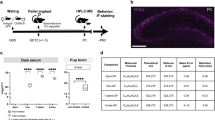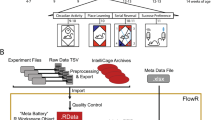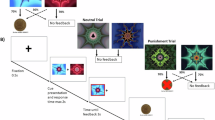Abstract
Animal studies have shown that blockade of central mineralocorticoid receptors (MR) has anxiolytic effects and impairs several aspects of cognitive function. No study to date assessed the effects of MR blockade on anxiety and cognitive function in humans. In the present study, 16 healthy young men were treated either with placebo or with 300 mg spironolactone, a MR-antagonist, at 1100, 1330, and 1630 hours in a balanced cross-over design with the two study conditions being 1 week apart. At 1500 hours, the panic symptoms provoking compound cholecystokinin-tetrapeptide (CCK-4) was administered i.v. on both occasions and panic symptoms were assessed. We measured plasma ACTH and cortisol between 1300 and 1900 hours and assessed cognitive function between 1800 and 1900 hours. CCK-4 elicited panic symptoms and increased ACTH and cortisol secretion in both conditions. Intensity of panic symptoms after CCK-4 was not different between spironolactone and placebo. Spironolactone significantly impaired selective attention and delayed recall of visuospatial memory, and diminished set shifting/mental flexibility on a trend level. Pretreatment with spironolactone led to higher baseline cortisol levels compared to placebo whereas no differences in stimulated cortisol, baseline ACTH, and stimulated ACTH emerged. Blockade of MR with spironolactone increases baseline cortisol secretion and impairs cognitive function but has no effect on experimentally induced panic symptoms in humans, for the study design and dosage of spironolactone used. The domains of cognitive function that are impaired after blockade of MR in men, that is, selective attention, visuospatial memory, and mental flexibility/set shifting appear to be remarkably similar to those described in animal studies.
Similar content being viewed by others
Log in or create a free account to read this content
Gain free access to this article, as well as selected content from this journal and more on nature.com
or
References
Arvat E, Maccagno B, Giordano R, Pellegrino M, Broglio F, Gianotti L et al (2001). Mineralocorticoid receptor blockade by canrenoate increases both spontaneous and stimulated adrenal function in humans. J Clin Endocrinol Metab 86: 3176–3181.
Berger S, Wolfer DP, Selbach O, Alter H, Erdmann G, Reichardt HM et al (2006). Loss of the limbic mineralocorticoid receptor impairs behavioral plasticity. Proc Natl Acad Sci USA 103: 195–200.
Bitran D, Shiekh M, Dowd JA, Dugan MM, Renda P (1998). Corticosterone is permissive to the anxiolytic effect that results from the blockade of hippocampal mineralocorticoid receptors. Pharmacol Biochem Behav 60: 879–887.
Bradwejn J, Koszycki D, Paradis M, Reece P, Hinton J, Sedman A (1995). Effect of CI-988 on cholecystokinin tetrapeptide-induced panic symptoms in healthy volunteers. Biol Psychiatry 38: 742–746.
Brickenkamp R (1978). Test d2. Handanweisung [Test d2. Manual]. Hogrefe: Göttingen (Germany).
Buckley T (2006). Hippocampal mineralocorticoid receptors in healthy aging and depression: overlapping cortisol circadian rhythm, sleep, and memory change. Depression: Mind and Body 2: 47–52.
Buckley TM, Schatzberg AF (2005). Aging and the role of the HPA axis and rhythm in sleep and memory-consolidation. Am J Geriatr Psychiatry 13: 344–352.
Conrad CD, Lupien SJ, Thanasoulis LC, McEwen BS (1997). The effects of type I and type II corticosteroid receptor agonists on exploratory behavior and spatial memory in the Y-maze. Brain Res 759: 76–83.
de Kloet ER, Joels M, Holsboer F (2005). Stress and the brain: from adaptation to disease. Nat Rev Neurosci 6: 463–475.
de Kloet ER, Oitzl MS, Joels M (1999). Stress and cognition: are corticosteroids good or bad guys? Trends Neurosci 22: 422–426.
deKloet E, Derijk R (2004). Signaling pathways in brain involved in predisposition and pathogenesis of stress-related disease: genetic and kinetic factors affecting the MR/GR balance. Ann NY Acad Sci 1032: 14–34.
Deuschle M, Weber B, Colla M, Muller M, Kniest A, Heuser I (1998). Mineralocorticoid receptor also modulates basal activity of hypothalamus-pituitary-adrenocortical system in humans. Neuroendocrinology 68: 355–360.
Dillon DJ, Gorman JM, Liebowitz MR, Fyer AJ, Klein DF (1987). Measurement of lactate-induced panic and anxiety. Psychiatry Res 20: 97–105.
Douma BR, Korte SM, Buwalda B, la Fleur SE, Bohus B, Luiten PG (1998). Repeated blockade of mineralocorticoid receptors, but not of glucocorticoid receptors impairs food rewarded spatial learning. Psychoneuroendocrinology 23: 33–44.
Gesing A, Bilang-Bleuel A, Droste SK, Linthorst AC, Holsboer F, Reul JM (2001). Psychological stress increases hippocampal mineralocorticoid receptor levels: involvement of corticotropin-releasing hormone. J Neurosci 21: 4822–4829.
Het S, Ramelow G, Wolf O (2005). A meta-analytic review of the effects of acute cortisol administration on human memory. Psychoneuroendocrinology 30: 771–784.
Heuser I, Deuschle M, Weber A, Kniest A, Ziegler C, Weber B et al (2000a). The role of mineralocorticoid receptors in the circadian activity of the human hypothalamus-pituitary-adrenal system: effect of age. Neurobiol Aging 21: 585–589.
Heuser I, Deuschle M, Weber B, Stalla GK, Holsboer F (2000b). Increased activity of the hypothalamus-pituitary-adrenal system after treatment with the mineralocorticoid receptor antagonist spironolactone. Psychoneuroendocrinology 25: 513–518.
Hiller W, Zaudig M, Mombour W, Bronisch T (1993). Routine psychiatric examinations guided by ICD-10 diagnostic checklists (International Diagnostic Checklists). Eur Arch Psychiatry Clin Neurosci 242: 218–223.
Holsboer F (2000). The corticosteroid receptor hypothesis of depression. Neuropsychopharmacology 23: 477–501.
Jahn H, Schick M, Kiefer F, Kellner M, Yassouridis A, Wiedemann K (2004). Metyrapone as additive treatment in major depression: a double-blind and placebo-controlled trial. Arch Gen Psychiatry 61: 1235–1244.
Kellner M, Baker DG, Yassouridis A, Bettinger S, Otte C, Naber D et al (2002a). Mineralocorticoid receptor function in patients with posttraumatic stress disorder. Am J Psychiatry 159: 1938–1940.
Kellner M, Yassouridis A, Hua Y, Wendrich M, Jahn H, Wiedemann K (2002b). Intravenous C-type natriuretic peptide augments behavioral and endocrine effects of cholecystokinin tetrapeptide in healthy men. J Psychiatr Res 36: 1–6.
Korte SM, de Boer SF, de Kloet ER, Bohus B (1995). Anxiolytic-like effects of selective mineralocorticoid and glucocorticoid antagonists on fear-enhanced behavior in the elevated plus-maze. Psychoneuroendocrinology 20: 385–394.
Ladd CO, Huot RL, Thrivikraman KV, Nemeroff CB, Plotsky PM (2004). Long-term adaptations in glucocorticoid receptor and mineralocorticoid receptor mRNA and negative feedback on the hypothalamo-pituitary-adrenal axis following neonatal maternal separation. Biol Psychiatry 55: 367–375.
Lezak MD (1995). Neuropsychological Assessment, Vol 3. edition. Oxford University Press: Oxford.
Lupien SJ, Fiocco A, Wan N, Maheu F, Lord C, Schramek T et al (2005). Stress hormones and human memory function across the lifespan. Psychoneuroendocrinology 30: 225–242.
Lupien SJ, Wilkinson CW, Briere S, Menard C, Ng Ying Kin NM, Nair NP (2002). The modulatory effects of corticosteroids on cognition: studies in young human populations. Psychoneuroendocrinology 27: 401–416.
Muller MB, Zimmermann S, Sillaber I, Hagemeyer TP, Deussing JM, Timpl P et al (2003). Limbic corticotropin-releasing hormone receptor 1 mediates anxiety-related behavior and hormonal adaptation to stress. Nat Neurosci 6: 1100–1107.
Oitzl MS, de Kloet ER (1992). Selective corticosteroid antagonists modulate specific aspects of spatial orientation learning. Behav Neurosci 106: 62–71.
Osterrieth PA (1944). Le test de copie d'une figure complexe; contribution a l'etude de la perception et de la memoire [Test of copying a complex figure; contribution to the study of perception and memory]. Archives de Psychologie 30: 206–356.
Otte C, Yassouridis A, Jahn H, Maass P, Stober N, Wiedemann K et al (2003). Mineralocorticoid receptor-mediated inhibition of the hypothalamic-pituitary-adrenal axis in aged humans. J Gerontol A Biol Sci Med Sci 58: B900–B905.
Pace TWW, Spencer RL (2005). Disruption of mineralocorticoid receptor function increases corticosterone responding to a mild, but not moderate, psychological stressor. Am J Physiol Endocrinol Metab 288: E1082–E1088.
Perez M, Godoy J (1998). Comparison between a ‘traditional’ memory test and a ‘behavioral’ memory battery in Spanish patients. J Clin Exp Neuropschol 20: 496–502.
Plihal W, Born J (1999). Memory consolidation in human sleep depends on inhibition of glucocorticoid release. Neuroreport 10: 2741–2747.
Rehfeld JF (2000). Cholecystokinin and panic disorder--three unsettled questions. Regul Pept 93: 79–83.
Reitan RM (1992). Trail Making Test. Manual of Administration and Scoring. Reitan Neuropsychology Laboratory: Tuscon, Arizona.
Rothuizen J, Reul JM, van Sluijs FJ, Mol JA, Rijnberk A, de Kloet ER (1993). Increased neuroendocrine reactivity and decreased brain mineralocorticoid receptor-binding capacity in aged dogs. Endocrinology 132: 161–168.
Sandi C, Rose SP (1994). Corticosteroid receptor antagonists are amnestic for passive avoidance learning in day-old chicks. Eur J Neurosci 6: 1292–1297.
Sandi C, Touyarotb K (2006). Mid-life stress and cognitive deficits during early aging in rats: individual differences and hippocampal correlates. Neurobiol Aging 27: 128–140.
Sheehan DV, Lecrubier Y, Sheehan KH, Amorim P, Janavs J, Weiller E et al (1998). The Mini-International Neuropsychiatric Interview (MINI): the development and validation of a structured diagnostic psychiatric interview for DSM-IV and ICD-10. J Clin Psychiatry 59: 22–33.
Smythe JW, Murphy D, Timothy C, Costall B (1997). Hippocampal mineralocorticoid, but not glucocorticoid, receptors modulate anxiety-like behavior in rats. Pharmacol Biochem Behav 56: 507–513.
Tewes U (1991). HAWIE-R: Hamburg-Wechsler Intelligenztest für Erwachsene; Handbuch und Testanweisung. Huber-Verlag: Bern.
Tytherleigh MY, Vedhara K, Lightman SL (2004). Mineralocorticoid and glucocorticoid receptors and their differential effects on memory performance in people with Addison's disease. Psychoneuroendocrinology 29: 712–723.
Wellhoener P, Born J, Fehm HL, Dodt C (2004). Elevated resting and exercise-induced cortisol levels after mineralocorticoid receptor blockade with canrenoate in healthy humans. J Clin Endocrinol Metab 89: 5048–5052.
Wiedemann K, Jahn H, Yassouridis A, Kellner M (2001). Anxiolyticlike effects of atrial natriuretic peptide on cholecystokinin tetrapeptide-induced panic attacks: preliminary findings. Arch Gen Psychiatry 58: 371–377.
Wilson B, Cockburn J, Baddeley A (1992). Rivermead Behavioural Memory Test. German translation. Thames Valley Test Company: Bury St. Edmunds (United Kingdom).
Yau JL, Hibberd C, Noble J, Seckl JR (2002). The effect of chronic fluoxetine treatment on brain corticosteroid receptor mRNA expression and spatial memory in young and aged rats. Brain Res Mol Brain Res 106: 117–123.
Yau JL, Noble J, Seckl JR (1999). Continuous blockade of brain mineralocorticoid receptors impairs spatial learning in rats. Neurosci Lett 277: 45–48.
Yau JL, Olsson T, Morris RG, Meaney MJ, Seckl JR (1995). Glucocorticoids, hippocampal corticosteroid receptor gene expression and antidepressant treatment: relationship with spatial learning in young and aged rats. Neuroscience 66: 571–581.
Young EA, Lopez JF, Murphy-Weinberg V, Watson SJ, Akil H (1998). The role of mineralocorticoid receptors in hypothalamic-pituitary-adrenal axis regulation in humans. J Clin Endocrinol Metab 83: 3339–3345.
Young EA, Lopez JF, Murphy-Weinberg V, Watson SJ, Akil H (2003). Mineralocorticoid receptor function in major depression. Arch Gen Psychiatry 60: 24–28.
Acknowledgements
We are grateful to the excellent technical assistance of Mrs Iris Remmlinger-Marten and Ms Kirsten Huwald. This study is part of the MD thesis of Ms Maike Koop and Ms Ana Maria Madrischewski. The study was supported by a grant from the Deutsche Forschungsgemeinschaft (DFG) to the first author (OT 209/4-1).
Author information
Authors and Affiliations
Corresponding author
Rights and permissions
About this article
Cite this article
Otte, C., Moritz, S., Yassouridis, A. et al. Blockade of the Mineralocorticoid Receptor in Healthy Men: Effects on Experimentally Induced Panic Symptoms, Stress Hormones, and Cognition. Neuropsychopharmacol 32, 232–238 (2007). https://doi.org/10.1038/sj.npp.1301217
Received:
Accepted:
Published:
Issue date:
DOI: https://doi.org/10.1038/sj.npp.1301217
Keywords
This article is cited by
-
Glucocorticoids and cognitive function: a walkthrough in endogenous and exogenous alterations
Journal of Endocrinological Investigation (2023)
-
Spironolactone as a potential new pharmacotherapy for alcohol use disorder: convergent evidence from rodent and human studies
Molecular Psychiatry (2022)
-
Cognitive and emotional empathy after stimulation of brain mineralocorticoid and NMDA receptors in patients with major depression and healthy controls
Neuropsychopharmacology (2020)
-
Subjective and physiological stress measurement in a multiple sclerosis sample and the relation with executive functions performance
Journal of Neural Transmission (2019)
-
HPA Axis Genes, and Their Interaction with Childhood Maltreatment, are Related to Cortisol Levels and Stress-Related Phenotypes
Neuropsychopharmacology (2017)



